| Listing 1 - 9 of 9 |
Sort by
|
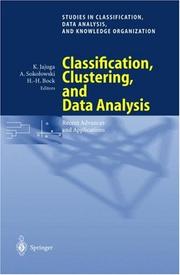
ISBN: 354043691X 3642561810 9783540436911 Year: 2002 Publisher: Berlin Springer
Abstract | Keywords | Export | Availability | Bookmark
 Loading...
Loading...Choose an application
- Reference Manager
- EndNote
- RefWorks (Direct export to RefWorks)
The present volume contains a selection of papers presented at the Eighth Conference of the International Federation of Classification Societies (IFCS) which was held in Cracow, Poland, July 16-19, 2002. All originally submitted papers were subject to a reviewing process by two independent referees, a procedure which resulted in the selection of the 53 articles presented in this volume. These articles relate to theoretical investigations as well as to practical applications and cover a wide range of topics in the broad domain of classifi cation, data analysis and related methods. If we try to classify the wealth of problems, methods and approaches into some representative (partially over lapping) groups, we find in particular the following areas: • Clustering • Cluster validation • Discrimination • Multivariate data analysis • Statistical methods • Symbolic data analysis • Consensus trees and phylogeny • Regression trees • Neural networks and genetic algorithms • Applications in economics, medicine, biology, and psychology. Given the international orientation of IFCS conferences and the leading role of IFCS in the scientific world of classification, clustering and data anal ysis, this volume collects a representative selection of current research and modern applications in this field and serves as an up-to-date information source for statisticians, data analysts, data mining specialists and computer scientists.
Cluster analysis --- Pattern perception --- Mathematical statistics --- #SBIB:303H520 --- 681.3*H2 --- 681.3*H2 Database management: security; integrity; protection--See also {?681.5*E5} --- Database management: security; integrity; protection--See also {?681.5*E5} --- Methoden sociale wetenschappen: techniek van de analyse, algemeen --- Database management. --- Probabilities. --- Applied mathematics. --- Engineering mathematics. --- Statistics . --- Mathematical statistics. --- Database Management. --- Probability Theory and Stochastic Processes. --- Applications of Mathematics. --- Statistical Theory and Methods. --- Probability and Statistics in Computer Science. --- Statistics for Business, Management, Economics, Finance, Insurance. --- Statistical analysis --- Statistical data --- Statistical methods --- Statistical science --- Mathematics --- Econometrics --- Engineering --- Engineering analysis --- Mathematical analysis --- Probability --- Statistical inference --- Combinations --- Chance --- Least squares --- Risk --- Data base management --- Data services (Database management) --- Database management services --- DBMS (Computer science) --- Generalized data management systems --- Services, Database management --- Systems, Database management --- Systems, Generalized database management --- Electronic data processing --- Statistics, Mathematical --- Statistics --- Probabilities --- Sampling (Statistics) --- Cluster analysis - Congresses. --- Pattern perception - Congresses. --- Mathematical statistics - Congresses.
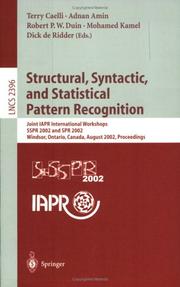

ISBN: 3540440119 3540706593 Year: 2002 Publisher: Berlin, Heidelberg : Springer Berlin Heidelberg : Imprint: Springer,
Abstract | Keywords | Export | Availability | Bookmark
 Loading...
Loading...Choose an application
- Reference Manager
- EndNote
- RefWorks (Direct export to RefWorks)
This volume contains all papers presented at SSPR 2002 and SPR 2002 hosted by the University of Windsor, Windsor, Ontario, Canada, August 6-9, 2002. This was the third time these two workshops were held back-to-back. SSPR was the ninth International Workshop on Structural and Syntactic Pattern Recognition and the SPR was the fourth International Workshop on Statis- cal Techniques in Pattern Recognition. These workshops have traditionally been held in conjunction with ICPR (International Conference on Pattern Recog- tion), and are the major events for technical committees TC2 and TC1, resp- tively, of the International Association of Pattern Recognition (IAPR). The workshops were held in parallel and closely coordinated. This was an attempt to resolve the dilemma of how to deal, in the light of the progressive specialization of pattern recognition, with the need for narrow-focus workshops without further fragmenting the ?eld and introducing yet another conference that would compete for the time and resources of potential participants. A total of 116 papers were received from many countries with the submission and reviewingprocesses beingcarried out separately for each workshop. A total of 45 papers were accepted for oral presentation and 35 for posters. In addition four invited speakers presented informative talks and overviews of their research. They were: Tom Dietterich, Oregon State University, USA Sven Dickinson, the University of Toronto, Canada Edwin Hancock, University of York, UK Anil Jain, Michigan State University, USA SSPR 2002 and SPR 2002 were sponsored by the IAPR and the University of Windsor.
Optical pattern recognition. --- Computer vision. --- Artificial intelligence. --- Computer science. --- Pattern Recognition. --- Image Processing and Computer Vision. --- Artificial Intelligence. --- Probability and Statistics in Computer Science. --- Informatics --- Science --- Machine vision --- Vision, Computer --- Artificial intelligence --- Image processing --- Pattern recognition systems --- AI (Artificial intelligence) --- Artificial thinking --- Electronic brains --- Intellectronics --- Intelligence, Artificial --- Intelligent machines --- Machine intelligence --- Thinking, Artificial --- Bionics --- Cognitive science --- Digital computer simulation --- Electronic data processing --- Logic machines --- Machine theory --- Self-organizing systems --- Simulation methods --- Fifth generation computers --- Neural computers --- Optical data processing --- Pattern perception --- Perceptrons --- Visual discrimination --- Pattern recognition. --- Optical data processing. --- Mathematical statistics. --- Mathematics --- Statistical inference --- Statistics, Mathematical --- Statistics --- Probabilities --- Sampling (Statistics) --- Optical computing --- Visual data processing --- Integrated optics --- Photonics --- Computers --- Design perception --- Pattern recognition --- Form perception --- Perception --- Figure-ground perception --- Statistical methods --- Optical equipment

ISBN: 3540437045 3540478876 Year: 2002 Publisher: Berlin, Germany ; New York, New York : Springer,
Abstract | Keywords | Export | Availability | Bookmark
 Loading...
Loading...Choose an application
- Reference Manager
- EndNote
- RefWorks (Direct export to RefWorks)
Knowledge discovery and data mining have become areas of growing significance because of the recent increasing demand for KDD techniques, including those used in machine learning, databases, statistics, knowledge acquisition, data visualization, and high performance computing. In view of this, and following the success of the five previous PAKDD conferences, the sixth Pacific-Asia Conference on Knowledge Discovery and Data Mining (PAKDD 2002) aimed to provide a forum for the sharing of original research results, innovative ideas, state-of-the-art developments, and implementation experiences in knowledge discovery and data mining among researchers in academic and industrial organizations. Much work went into preparing a program of high quality. We received 128 submissions. Every paper was reviewed by 3 program committee members, and 32 were selected as regular papers and 20 were selected as short papers, representing a 25% acceptance rate for regular papers. The PAKDD 2002 program was further enhanced by two keynote speeches, delivered by Vipin Kumar from the Univ. of Minnesota and Rajeev Rastogi from AT&T. In addition, PAKDD 2002 was complemented by three tutorials, XML and data mining (by Kyuseok Shim and Surajit Chadhuri), mining customer data across various customer touchpoints at- commerce sites (by Jaideep Srivastava), and data clustering analysis, from simple groupings to scalable clustering with constraints (by Osmar Zaiane and Andrew Foss).
Database management --- Database searching --- Data mining --- Computer Science --- Engineering & Applied Sciences --- Computer science. --- Data structures (Computer science). --- Mathematical statistics. --- Database management. --- Artificial intelligence. --- Computers and civilization. --- Statistics. --- Computer Science. --- Artificial Intelligence (incl. Robotics). --- Data Structures, Cryptology and Information Theory. --- Database Management. --- Probability and Statistics in Computer Science. --- Statistics and Computing/Statistics Programs. --- Computers and Society. --- Statistical analysis --- Statistical data --- Statistical methods --- Statistical science --- Mathematics --- Econometrics --- Civilization and computers --- Civilization --- AI (Artificial intelligence) --- Artificial thinking --- Electronic brains --- Intellectronics --- Intelligence, Artificial --- Intelligent machines --- Machine intelligence --- Thinking, Artificial --- Bionics --- Cognitive science --- Digital computer simulation --- Electronic data processing --- Logic machines --- Machine theory --- Self-organizing systems --- Simulation methods --- Fifth generation computers --- Neural computers --- Data base management --- Data services (Database management) --- Database management services --- DBMS (Computer science) --- Generalized data management systems --- Services, Database management --- Systems, Database management --- Systems, Generalized database management --- Statistical inference --- Statistics, Mathematical --- Statistics --- Probabilities --- Sampling (Statistics) --- Information structures (Computer science) --- Structures, Data (Computer science) --- Structures, Information (Computer science) --- File organization (Computer science) --- Abstract data types (Computer science) --- Informatics --- Science --- Data structures (Computer scienc. --- Artificial Intelligence. --- Data Structures and Information Theory. --- Statistics .
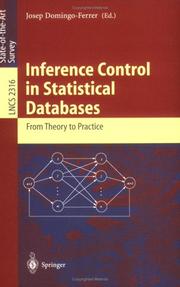
ISBN: 3540478043 3540436146 Year: 2002 Publisher: Berlin, Heidelberg : Springer Berlin Heidelberg : Imprint: Springer,
Abstract | Keywords | Export | Availability | Bookmark
 Loading...
Loading...Choose an application
- Reference Manager
- EndNote
- RefWorks (Direct export to RefWorks)
Inference control in statistical databases, also known as statistical disclosure limitation or statistical confidentiality, is about finding tradeoffs to the tension between the increasing societal need for accurate statistical data and the legal and ethical obligation to protect privacy of individuals and enterprises which are the source of data for producing statistics. Techniques used by intruders to make inferences compromising privacy increasingly draw on data mining, record linkage, knowledge discovery, and data analysis and thus statistical inference control becomes an integral part of computer science. This coherent state-of-the-art survey presents some of the most recent work in the field. The papers presented together with an introduction are organized in topical sections on tabular data protection, microdata protection, and software and user case studies.
Computer Science --- Engineering & Applied Sciences --- Database security. --- Statistics --- Statistical analysis --- Statistical data --- Statistical methods --- Statistical science --- Data base security --- Databases --- Security measures --- Computer science. --- Computer security. --- Data encryption (Computer science). --- Mathematical statistics. --- Database management. --- Artificial intelligence. --- Computers and civilization. --- Computer Science. --- Systems and Data Security. --- Data Encryption. --- Probability and Statistics in Computer Science. --- Database Management. --- Computers and Society. --- Artificial Intelligence (incl. Robotics). --- Mathematics --- Econometrics --- Computer security --- Cryptology. --- Artificial Intelligence. --- AI (Artificial intelligence) --- Artificial thinking --- Electronic brains --- Intellectronics --- Intelligence, Artificial --- Intelligent machines --- Machine intelligence --- Thinking, Artificial --- Bionics --- Cognitive science --- Digital computer simulation --- Electronic data processing --- Logic machines --- Machine theory --- Self-organizing systems --- Simulation methods --- Fifth generation computers --- Neural computers --- Data base management --- Data services (Database management) --- Database management services --- DBMS (Computer science) --- Generalized data management systems --- Services, Database management --- Systems, Database management --- Systems, Generalized database management --- Informatics --- Science --- Data encoding (Computer science) --- Encryption of data (Computer science) --- Cryptography --- Computer privacy --- Computer system security --- Computer systems --- Computers --- Cyber security --- Cybersecurity --- Electronic digital computers --- Protection of computer systems --- Security of computer systems --- Data protection --- Security systems --- Hacking --- Protection --- Inference. --- Ampliative induction --- Induction, Ampliative --- Inference (Logic) --- Reasoning --- Civilization and computers --- Civilization --- Statistical inference --- Statistics, Mathematical --- Probabilities --- Sampling (Statistics)
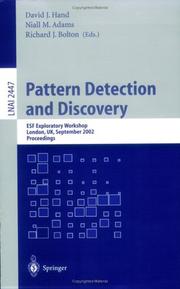
ISBN: 3540457283 3540441484 Year: 2002 Publisher: Berlin, Heidelberg : Springer Berlin Heidelberg : Imprint: Springer,
Abstract | Keywords | Export | Availability | Bookmark
 Loading...
Loading...Choose an application
- Reference Manager
- EndNote
- RefWorks (Direct export to RefWorks)
The collation of large electronic databases of scienti?c and commercial infor- tion has led to a dramatic growth of interest in methods for discovering struc- res in such databases. These methods often go under the general name of data mining. One important subdiscipline within data mining is concerned with the identi?cation and detection of anomalous, interesting, unusual, or valuable - cords or groups of records, which we call patterns. Familiar examples are the detection of fraud in credit-card transactions, of particular coincident purchases in supermarket transactions, of important nucleotide sequences in gene sequence analysis, and of characteristic traces in EEG records. Tools for the detection of such patterns have been developed within the data mining community, but also within other research communities, typically without an awareness that the - sic problem was common to many disciplines. This is not unreasonable: each of these disciplines has a large literature of its own, and a literature which is growing rapidly. Keeping up with any one of these is di?cult enough, let alone keeping up with others as well, which may in any case be couched in an - familiar technical language. But, of course, this means that opportunities are being lost, discoveries relating to the common problem made in one area are not transferred to the other area, and breakthroughs and problem solutions are being rediscovered, or not discovered for a long time, meaning that e?ort is being wasted and opportunities may be lost.
Data mining --- Pattern recognition systems --- Computer Science --- Mechanical Engineering - General --- Mechanical Engineering --- Engineering & Applied Sciences --- Computer science. --- File organization (Computer science). --- Algorithms. --- Mathematical statistics. --- Database management. --- Information storage and retrieval. --- Artificial intelligence. --- Computer Science. --- Database Management. --- Artificial Intelligence (incl. Robotics). --- Algorithm Analysis and Problem Complexity. --- Files. --- Probability and Statistics in Computer Science. --- Information Storage and Retrieval. --- Computer software. --- Data structures (Computer scienc. --- Information storage and retrieva. --- Artificial Intelligence. --- Data Structures and Information Theory. --- Information storage and retrieval systems. --- Data structures (Computer science). --- AI (Artificial intelligence) --- Artificial thinking --- Electronic brains --- Intellectronics --- Intelligence, Artificial --- Intelligent machines --- Machine intelligence --- Thinking, Artificial --- Bionics --- Cognitive science --- Digital computer simulation --- Electronic data processing --- Logic machines --- Machine theory --- Self-organizing systems --- Simulation methods --- Fifth generation computers --- Neural computers --- Data base management --- Data services (Database management) --- Database management services --- DBMS (Computer science) --- Generalized data management systems --- Services, Database management --- Systems, Database management --- Systems, Generalized database management --- Mathematics --- Statistical inference --- Statistics, Mathematical --- Statistics --- Probabilities --- Sampling (Statistics) --- Information structures (Computer science) --- Structures, Data (Computer science) --- Structures, Information (Computer science) --- File organization (Computer science) --- Abstract data types (Computer science) --- Algorism --- Algebra --- Arithmetic --- Statistical methods --- Foundations

ISBN: 3540458042 3540442618 Year: 2002 Publisher: Berlin, Heidelberg : Springer Berlin Heidelberg : Imprint: Springer,
Abstract | Keywords | Export | Availability | Bookmark
 Loading...
Loading...Choose an application
- Reference Manager
- EndNote
- RefWorks (Direct export to RefWorks)
Markov Chains are widely used as stochastic models to study a broad spectrum of system performance and dependability characteristics. This monograph is devoted to compositional specification and analysis of Markov chains. Based on principles known from process algebra, the author systematically develops an algebra of interactive Markov chains. By presenting a number of distinguishing results, of both theoretical and practical nature, the author substantiates the claim that interactive Markov chains are more than just another formalism: Among other, an algebraic theory of interactive Markov chains is developed, devise algorithms to mechanize compositional aggregation are presented, and state spaces of several million states resulting from the study of an ordinary telefone system are analyzed.
Markov processes --- Mathematical Statistics --- Mathematics --- Physical Sciences & Mathematics --- Markov processes. --- Analysis, Markov --- Chains, Markov --- Markoff processes --- Markov analysis --- Markov chains --- Markov models --- Models, Markov --- Processes, Markov --- Mathematics. --- Computer system failures. --- Software engineering. --- Computers. --- Computer logic. --- Mathematical statistics. --- Probabilities. --- Probability Theory and Stochastic Processes. --- Software Engineering. --- Logics and Meanings of Programs. --- System Performance and Evaluation. --- Computation by Abstract Devices. --- Probability and Statistics in Computer Science. --- Stochastic processes --- Distribution (Probability theory. --- Logic design. --- Computer system performance. --- Computer science. --- Informatics --- Science --- Design, Logic --- Design of logic systems --- Digital electronics --- Electronic circuit design --- Logic circuits --- Machine theory --- Switching theory --- Computer software engineering --- Engineering --- Distribution functions --- Frequency distribution --- Characteristic functions --- Probabilities --- Statistical inference --- Statistics, Mathematical --- Statistics --- Sampling (Statistics) --- Automatic computers --- Automatic data processors --- Computer hardware --- Computing machines (Computers) --- Electronic brains --- Electronic calculating-machines --- Electronic computers --- Hardware, Computer --- Computer systems --- Cybernetics --- Calculators --- Cyberspace --- Computer failures --- Computer malfunctions --- Failure of computer systems --- System failures (Engineering) --- Fault-tolerant computing --- Computer science logic --- Logic, Symbolic and mathematical --- Probability --- Combinations --- Chance --- Least squares --- Mathematical statistics --- Risk --- Statistical methods --- Failures

ISBN: 3540361049 3540000445 Year: 2002 Publisher: Berlin, Heidelberg : Springer Berlin Heidelberg : Imprint: Springer,
Abstract | Keywords | Export | Availability | Bookmark
 Loading...
Loading...Choose an application
- Reference Manager
- EndNote
- RefWorks (Direct export to RefWorks)
The International Symposium on Medical Data Analysis is an important - riodical opportunity to exchange ideas and ?rst-hand experiences with groups interested in the medical applications of innovative hardware and software tools. The massive information available through continuous improvements in the various modeling approaches to Medical Data Analysis is re?ected in the - sults, dealing with quite di?erent topics, presented during the Third Edition of the Symposium (ISMDA 2002). They have been grouped into the following four categories: (1) Data Mining and Decision Support Systems; (2) Medical Informatics and Modeling; (3) Time-Series Analysis; and (4) Medical Imaging. In setting up the symposium program we tried to avoid, even with the sho- age of time, parallel sessions. Thus, all participants had the chance to catch all the oral presentations, and we hope that this third proceedings volume will extend this chance also to non-participants. As for the previous volumes, it c- tains extensive up-to-date chapters on Medical Data Analysis, packed with ideas, suggestions, and solutions to many problems typical of this ?eld.
Medicine --- Data Interpretation, Statistical --- Medical Informatics Applications --- Image Processing, Computer-Assisted --- Diagnosis, Computer-Assisted --- Statistics as Topic --- Diagnosis --- Decision Making, Computer-Assisted --- Decision Support Techniques --- Computing Methodologies --- Medical Informatics --- Health Care Evaluation Mechanisms --- Information Science --- Investigative Techniques --- Analytical, Diagnostic and Therapeutic Techniques and Equipment --- Epidemiologic Methods --- Quality of Health Care --- Public Health --- Health Care Quality, Access, and Evaluation --- Environment and Public Health --- Health Care --- Medical Research --- Health & Biological Sciences --- Statistical methods --- Research --- Clinical sciences --- Medical profession --- Medicine. --- Health informatics. --- Epidemiology. --- Mathematical statistics. --- Database management. --- Information storage and retrieval. --- Artificial intelligence. --- Medicine & Public Health. --- Database Management. --- Health Informatics. --- Probability and Statistics in Computer Science. --- Information Storage and Retrieval. --- Artificial Intelligence (incl. Robotics). --- Human biology --- Life sciences --- Medical sciences --- Pathology --- Physicians --- Medical records --- Computer science. --- Information storage and retrieva. --- Artificial Intelligence. --- Data processing. --- AI (Artificial intelligence) --- Artificial thinking --- Electronic brains --- Intellectronics --- Intelligence, Artificial --- Intelligent machines --- Machine intelligence --- Thinking, Artificial --- Bionics --- Cognitive science --- Digital computer simulation --- Electronic data processing --- Logic machines --- Machine theory --- Self-organizing systems --- Simulation methods --- Fifth generation computers --- Neural computers --- Informatics --- Science --- EHR systems --- EHR technology --- EHRs (Electronic health records) --- Electronic health records --- Electronic medical records --- EMR systems --- EMRs (Electronic medical records) --- Information storage and retrieval systems --- Data base management --- Data services (Database management) --- Database management services --- DBMS (Computer science) --- Generalized data management systems --- Services, Database management --- Systems, Database management --- Systems, Generalized database management --- Diseases --- Public health --- Medical care --- Information storage and retrieval systems. --- Automatic data storage --- Automatic information retrieval --- Automation in documentation --- Computer-based information systems --- Data processing systems --- Data storage and retrieval systems --- Discovery systems, Information --- Information discovery systems --- Information processing systems --- Information retrieval systems --- Machine data storage and retrieval --- Mechanized information storage and retrieval systems --- Computer systems --- Electronic information resources --- Data libraries --- Digital libraries --- Information organization --- Information retrieval --- Health Workforce --- Mathematics --- Statistical inference --- Statistics, Mathematical --- Statistics --- Probabilities --- Sampling (Statistics) --- Clinical informatics --- Health informatics --- Medical information science --- Information science --- Data processing

ISSN: 03029743 ISBN: 9783540433385 3540433384 3540458840 Year: 2002 Volume: 2281 Publisher: Berlin, Heidelberg : Springer Berlin Heidelberg : Imprint: Springer,
Abstract | Keywords | Export | Availability | Bookmark
 Loading...
Loading...Choose an application
- Reference Manager
- EndNote
- RefWorks (Direct export to RefWorks)
Data mining --- Knowledge acquisition (Expert systems) --- Research --- Computer science. --- Data structures (Computer science). --- Algorithms. --- Mathematical statistics. --- Database management. --- Information storage and retrieval. --- Artificial intelligence. --- Computer Science. --- Artificial Intelligence (incl. Robotics). --- Data Structures, Cryptology and Information Theory. --- Database Management. --- Information Storage and Retrieval. --- Probability and Statistics in Computer Science. --- Algorithm Analysis and Problem Complexity. --- Acquisition, Knowledge (Expert systems) --- Expertise acquisition (Expert systems) --- Expert systems (Computer science) --- Algorithmic knowledge discovery --- Factual data analysis --- KDD (Information retrieval) --- Knowledge discovery in data --- Knowledge discovery in databases --- Mining, Data --- Database searching --- Data structures (Computer scienc. --- Information storage and retrieva. --- Computer software. --- Artificial Intelligence. --- Data Structures and Information Theory. --- Information storage and retrieval systems. --- Software, Computer --- Computer systems --- Informatics --- Science --- Data base management --- Data services (Database management) --- Database management services --- DBMS (Computer science) --- Generalized data management systems --- Services, Database management --- Systems, Database management --- Systems, Generalized database management --- Electronic data processing --- AI (Artificial intelligence) --- Artificial thinking --- Electronic brains --- Intellectronics --- Intelligence, Artificial --- Intelligent machines --- Machine intelligence --- Thinking, Artificial --- Bionics --- Cognitive science --- Digital computer simulation --- Logic machines --- Machine theory --- Self-organizing systems --- Simulation methods --- Fifth generation computers --- Neural computers --- Automatic data storage --- Automatic information retrieval --- Automation in documentation --- Computer-based information systems --- Data processing systems --- Data storage and retrieval systems --- Discovery systems, Information --- Information discovery systems --- Information processing systems --- Information retrieval systems --- Machine data storage and retrieval --- Mechanized information storage and retrieval systems --- Electronic information resources --- Data libraries --- Digital libraries --- Information organization --- Information retrieval --- Information structures (Computer science) --- Structures, Data (Computer science) --- Structures, Information (Computer science) --- File organization (Computer science) --- Abstract data types (Computer science) --- Algorism --- Algebra --- Arithmetic --- Mathematics --- Statistical inference --- Statistics, Mathematical --- Statistics --- Probabilities --- Sampling (Statistics) --- Foundations --- Statistical methods --- Data mining - Research - Japan --- Knowledge acquisition (Expert systems) - Research - Japan
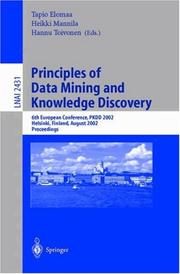
ISBN: 3540456813 3540440372 Year: 2002 Publisher: Berlin, Heidelberg : Springer Berlin Heidelberg : Imprint: Springer,
Abstract | Keywords | Export | Availability | Bookmark
 Loading...
Loading...Choose an application
- Reference Manager
- EndNote
- RefWorks (Direct export to RefWorks)
Computer Science --- Engineering & Applied Sciences --- Data mining --- Database searching --- Database management: security; integrity; protection--See also {?681.5*E5}--Congressen --- Probability and statistics: probabilistic algorithms (including Monte Carlo);random number generation; statistical computing; statistical software (Mathematics of computing)--Congressen --- Grammars and other rewriting systems: decision problems; grammar types; parallel rewriting systems; parsing; thue systems (Mathematical logic and formal languages)--See also {681.3*D31}--Congressen --- Mathematical logic: computability theory; computational logic; lambda calculus; logic programming; mechanical theorem proving; model theory; proof theory;recursive function theory--See also {681.3*F11}; {681.3*I22}; {681.3*I23}--Congressen --- Computer science. --- Mathematical logic. --- Mathematical statistics. --- Database management. --- Information storage and retrieval. --- Artificial intelligence. --- Text processing (Computer science). --- Computer Science. --- Database Management. --- Artificial Intelligence (incl. Robotics). --- Mathematical Logic and Formal Languages. --- Probability and Statistics in Computer Science. --- Document Preparation and Text Processing. --- Information Storage and Retrieval. --- 681.3*F41 <063> --- 681.3*F42 <063> --- 681.3*G3 <063> --- 681.3*H2 <063> --- 681.3*H3 <063> --- 681.3*I2 <063> --- 681.3*I7 <063> --- 681.3*J2 <063> --- 681.3*J2 <063> Physical sciences and engineering (Computer applications)--Congressen --- Physical sciences and engineering (Computer applications)--Congressen --- 681.3*I2 <063> Artificial intelligence. AI--Congressen --- Artificial intelligence. AI--Congressen --- Information storage and retrieval--Congressen --- Text processing (Computing methodologies)--See also {681.3*H4}--Congressen --- Processing, Text (Computer science) --- Database management --- Electronic data processing --- Information storage and retrieval systems --- Word processing --- AI (Artificial intelligence) --- Artificial thinking --- Electronic brains --- Intellectronics --- Intelligence, Artificial --- Intelligent machines --- Machine intelligence --- Thinking, Artificial --- Bionics --- Cognitive science --- Digital computer simulation --- Logic machines --- Machine theory --- Self-organizing systems --- Simulation methods --- Fifth generation computers --- Neural computers --- Data base management --- Data services (Database management) --- Database management services --- DBMS (Computer science) --- Generalized data management systems --- Services, Database management --- Systems, Database management --- Systems, Generalized database management --- Mathematics --- Statistical inference --- Statistics, Mathematical --- Statistics --- Probabilities --- Sampling (Statistics) --- Algebra of logic --- Logic, Universal --- Mathematical logic --- Symbolic and mathematical logic --- Symbolic logic --- Algebra, Abstract --- Metamathematics --- Set theory --- Syllogism --- Informatics --- Science --- Statistical methods --- Natural language processing (Computer science). --- Information storage and retrieva. --- Artificial Intelligence. --- Natural Language Processing (NLP). --- Information storage and retrieval systems. --- NLP (Computer science) --- Artificial intelligence --- Human-computer interaction --- Semantic computing --- Automatic data storage --- Automatic information retrieval --- Automation in documentation --- Computer-based information systems --- Data processing systems --- Data storage and retrieval systems --- Discovery systems, Information --- Information discovery systems --- Information processing systems --- Information retrieval systems --- Machine data storage and retrieval --- Mechanized information storage and retrieval systems --- Computer systems --- Electronic information resources --- Data libraries --- Digital libraries --- Information organization --- Information retrieval
| Listing 1 - 9 of 9 |
Sort by
|

 Search
Search Feedback
Feedback About
About Help
Help News
News